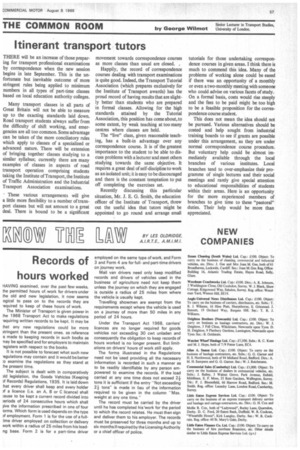Itinerant transport tutors
Page 59

If you've noticed an error in this article please click here to report it so we can fix it.
THERE will be an increase of those preparing for transport professional examinations by correspondence when the new session begins in late September. This is the unfortunate but inevitable outcome of more stringent rules being applied to minimum numbers in all types of part-time classes based on local education authority colleges.
Many transport classes in all parts of Great Britain will not be able to measure up to the exacting standards laid down. Road transport students always suffer from the difficulty of shift working, and emergencies are all too common. Some advantage can be taken of the more conciliatory rules which apply to classes of a specialized or advanced nature. There will be extension of bringing together classes studying to a similar syllabus; currently there are many examples of classes in aspects of road transport operation comprising students taking the Institute of Transport, the Institute of Traffic Administration and the Industrial Transport Association examinations.
• These various arrangements will give a little more flexibility to a number of transport classes but will not amount to a great deal. There is bound to be a significant movement towards correspondence courses as more classes than usual are closed. , Happily, the record of correspondence courses dealing with transport examinations is quite good. Indeed, the Transport Tutorial Association (which prepares exclusively for the Institute of Transport awards) has the proud record of having results that are slightly better than students who are prepared in formal classes. Allowing for the high standards attained by the Tutorial Association, this position has come about, to some extent, by weak teaching at too many centres where classes are held.
The "live" class, given reasonable teaching, has a built-in advantage over any correspondence course. It is of the greatest importance to the student to be able to discuss problems with a lecturer and meet others studying towards the same objective. It requires a great deal of self-discipline to work as an isolated unit; it is easy to be discouraged and there is the constant temptation to put off completing the exercises set.
Recently discussing this particular situation, Mr. J. E. G. Smith, the education officer of the Institute of Transport, threw out the useful idea that tutors might be appointed to go round and arrange small tutorials for those undertaking correspondence courses in given areas. I think there is much to commend this idea. Many of the problems of working alone could be eased if there was an opportunity of a monthly or even a two-monthly meeting with someone who could advise on various facets of study. On a formal basis, costs would rise steeply and the fees to be paid might be too high to be a feasible proposition for the correspondence course student.
This does not mean the idea should not be pursued. Various alternatives should be costed and help sought from industrial training boards to see if grants are possible under this arrangement, as they are under normal correspondence course procedure. But voluntary help could be almost immediately available through the local branches of various institutes. Local branches tend to over-emphasize their programme of single lectures and their social meetings and rarely give special attention to educational responsibilities of students within their areas. Here is an opportunity for the more experienced members of branches to give time to these "pastoral" duties. Their help would be more than appreciated.




































































































